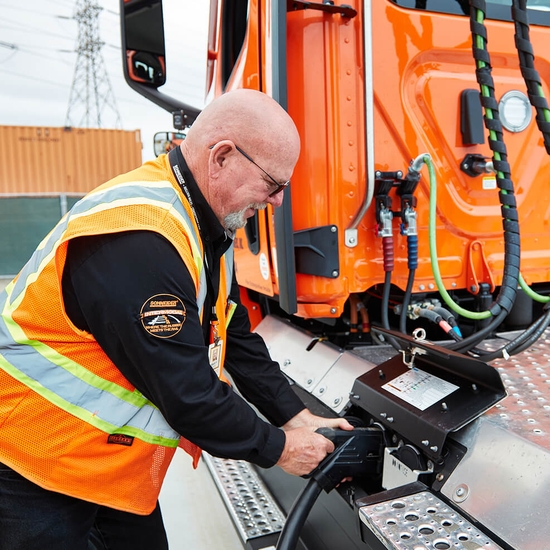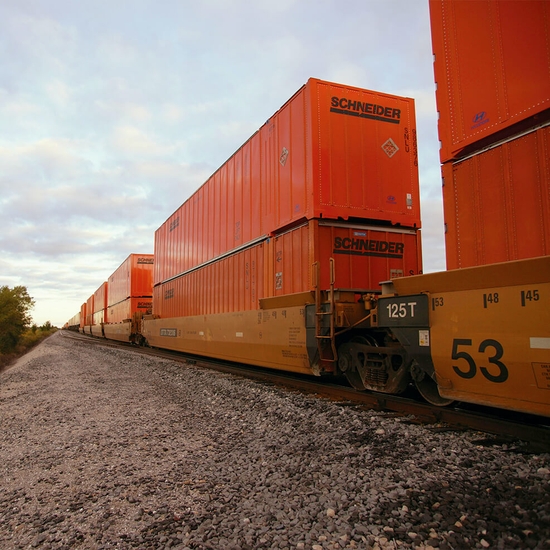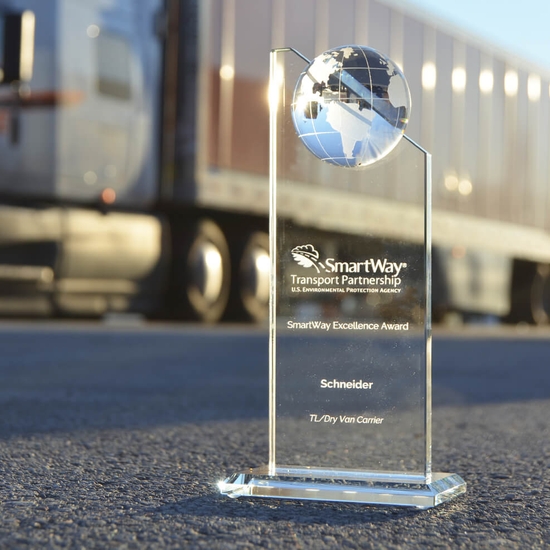Fuel efficiency
Reducing emissions through innovation
We are committed to reducing emissions and leading the industry in sustainable practices:
- Battery Electric Vehicles
- Alternative Fuels
- Equipment Efficiency

Leading with battery electric vehicles
Schneider operates one of the largest battery electric vehicle (BEV) fleets in North America, with almost 100 Freightliner eCascadias. To power the trucks, we opened a large-scale charging depot at its South El Monte Operations Center in California. Our BEV fleet surpassed over 6 million zero emission miles in 2024. We also replaced two diesel yard spotters at our cross-dock facility in Southern California with electric yard spotters, saving an estimated 70 thousand pounds of CO2 each year.
Leveraging our intermodal network to cut emissions and delays
Rail freight also offers significant environmental benefits, with one ton able to travel up to 500 miles on a single gallon of fuel, providing additional fuel-saving opportunities for our customers.
Our rail partnerships with the Union Pacific, CSX and CPKC offer truck-like service across the U.S. and Mexico enabling reliable capacity and efficient and safe cargo movement.

Sustainable solutions for our customers
Schneider helps shippers optimize networks and reduce their carbon footprint through reduction in empty miles, freight consolidation and by selecting the right mode of transportation. We maintain a modern, fuel-efficient fleet and help customers reduce Scope 3 emissions through tailored solutions.
Optimizing our existing fleet
Our equipment plays a crucial role in our sustainability efforts and allows us to have one of the most fuel-efficient fleets in the industry. Our scale allows us to test and implement advanced technologies effectively and our unique approach to equipment engineering attracts and supports informed decision making.

Our trucks optimize efficiency through:
Advanced aerodynamics: We maximize aerodynamics on both tractors and trailers, minimizing air resistance and improving fuel efficiency.
Advanced powertrains: State-of-the-art drivetrain technology ensures optimal performance and reduced emissions.
MirrorEye ®: Innovative camera-based mirror systems enhance safety while reducing drag.
Use of biodiesel blends and actively testing CNG and RNG to diversify energy sources.

Backed by SmartWay
Schneider was a charter member of the United States Environmental Protection Agency's (EPA) SmartWay program, established in 2004 — a voluntary collaboration between the EPA and freight industry designed to increase energy efficiency and significantly reduce greenhouse gas and air pollution.
Schneider is recognized as a SmartWay High Performer for operating an exceptionally efficient and clean fleet, burning less fuel per mile traveled and for every ton of freight moved.











